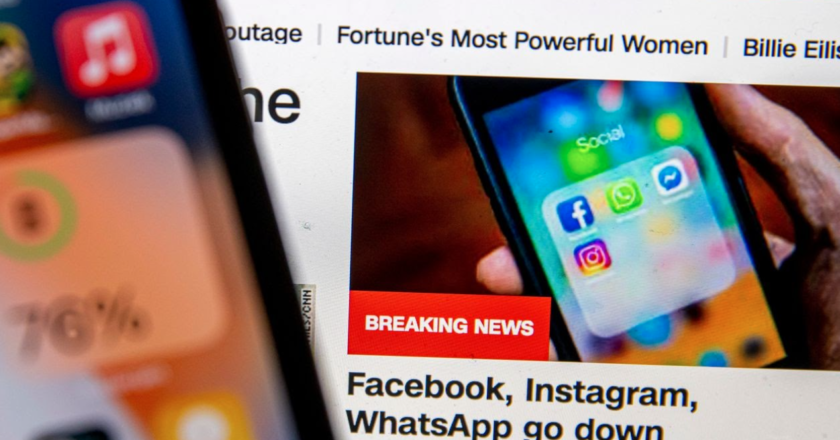Social media platform Facebook was down for over six hours due to a faulty configuration change on Monday, October 5th. This worldwide shutdown was felt across the globe, impacting the billions of users who frequent the site and rely on its services.
Due to a defective configuration change in Facebook’s networking systems, Monday, October 5th marked the tech giant’s largest outage since 2008, rendering the app and countless others owned by the corporation unusable for over six hours. The international shutdown cost the company tens of millions and affected people who use these services for a multitude of reasons.
The outage initially began before noon ET when the “backbone” of Facebook’s network that communicates between data centers experienced a malfunction after a maintenance command backfired. This resulted in the platform being inoperational for the 3 billion users until engineers restored the network later that day.
Facebook owns many large social apps, including Instagram, WhatsApp, and Messenger, all of which went down on Monday. These platforms are used for a variety of reasons: communication between family and friends, running businesses through outreach into a community, and many more. Due to this malfunction, any small business owners who frequently use these services to support themselves could no longer receive income for their content or advertise their companies.
The social media platform released a blog post on the night of Monday, October 5 addressing the incident and apologizing for the devastating effects that rippled across the globe. “We understand the impact that outages like these have on people’s lives, as well as our responsibility to keep people informed about disruptions to our services,” wrote Santosh Janardhan, the Vice President of Infrastructure at Facebook, “We are sorry for the inconvenience caused by today’s outage across our platforms.”
The last outage that was relatively close to the severity of the outage earlier this month occurred in 2008 after a bug forced the entire site offline for a day. At the time, however, only 80 million people used Facebook, a minuscule number compared to that of today.
A day before the outage, October 4, whistleblower Frances Haugen leaked private information on Facebook to the Wall Street Journal and Congress, revealing herself in an interview with “60 Minutes.” Frances Haugen, a former product manager on Facebook’s civic misinformation team, decided to speak out about her concerns for the company’s morality after seeing it first-hand. She wrote on her blog, “I saw Facebook repeatedly encounter conflicts between its own profits and our safety,” and concludes that, “Facebook consistently resolved those conflicts in favor of its own profits.”
Taking action, Haugen released confidential documents that revealed how the company’s executives were aware of the negative influences that their platforms have on the world’s youth and how news is spread, among other things. During her interview with “60 Minutes” on Sunday evening she revealed her identity and further spoke about the large corporations’ ignorance towards public safety in their pursuit of a larger profit.
All forms of social media can be used for good, however, they can also be the root of many issues that are seen throughout today’s society. Misinformation and fake news are easily spread when anyone can share an opinion and label it as the “truth,” cyber-bullying allows anonymous users to troll others typically without repercussions, and harsh expectations for a perfect body that young girls see every day scrolling through their feed are all negative effects of the outreach technology has today.
While the official statement on why the outage occurred on Monday is because of a technological error, it is certainly strange how it transpired within 24 hours of the Haugen whistleblowing interview. Her accusatory statements condemning Facebook’s obvious disregard for the negative impacts of their social media platforms could have been threatening to the company. No large corporation particularly likes to have its corrupt underside brought to the public eye, especially one with the outreach and impact that Facebook has. In response to the controversy, a worldwide shutdown of the platforms is entirely plausible. Nevertheless, nothing can be proven yet.
Works Cited
Conger, Kate. “Facebook says its outage was caused by a cascade of errors.” The New York Times, 5 Oct. 2021, www.nytimes.com/2021/10/05/technology/facebook-outage-cause.html. Accessed 16 Oct. 2021.
Feiner, Lauren. “Facebook whistleblower reveals identity, accuses the platform of a ‘betrayal of democracy.'” CNBC, 3 Oct. 2021, www.cnbc.com/2021/10/04/facebook-whistleblower-reveals-identity-ahead-of-60-minutes-interview.html. Accessed 16 Oct. 2021.
Haugen, Frances. “Opening Statement to Senate Committee on Commerce, Science & Transportation.” Frances Haugen, 5 Oct. 2021, www.franceshaugen.com/blog/b9xlswihkike7639nn4ie23odz9eqy. Accessed 16 Oct. 2021.
Janardhan, Santosh. “Update about the October 4th outage.” Facebook Engineering, Facebook, 4 Oct. 2021, engineering.fb.com/2021/10/04/networking-traffic/outage/. Accessed 16 Oct. 2021.
Lawler, Richard, and Alex Heath. “Facebook is back online after a massive outage that also took down Instagram, WhatsApp, Messenger, and Oculus.” The Verge, 5 Oct. 2021, www.theverge.com/2021/10/4/22708989/instagram-facebook-outage-messenger-whatsapp-error. Accessed 16 Oct. 2021.
Subin, Samantha. “Facebook is back online after suffering its worst outage since 2008.” CNBC, 4 Oct. 2021, www.cnbc.com/2021/10/04/facebook-instagram-and-whatsapp-are-down.html. Accessed 16 Oct. 2021.

